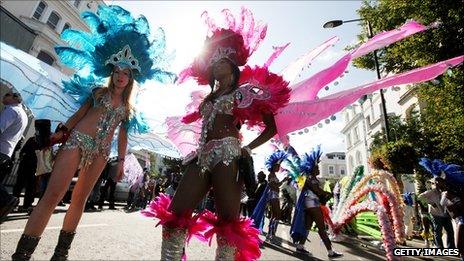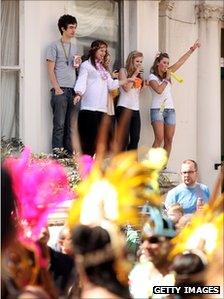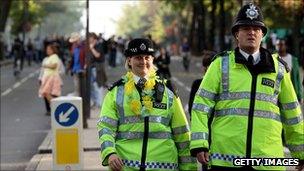Keeping the Notting Hill Carnival spirit alive
- Published

Organisers hope the Notting Hill Carnival will become an arts festival like the Edinburgh Fringe
Christopher Boothman attended his first Notting Hill Carnival when he was 15, getting involved with the sound systems, playing in the steel bands and helping to make costumes.
Now, at the age of 55 he is co-director of the Notting Hill Carnival and has big plans for its future.
Since the first one in 1964, Notting Hill Carnival has grown to the point where it now attracts a million spectators over two days and is thought to be the largest street festival in Europe.
However, its popularity and apparent success, masks an organisational structure that is dependent on volunteers, is chronically short of funding and is desperate for a new era of professionalism.
Even Mr Boothman, a solicitor and member of the Metropolitan Police Authority, is unpaid despite spending as much as three days a week on carnival business.

One million people attend the Notting Hill Carnival every year
It is a role, he admits, that he finds difficult to enjoy.
"You have to be really tough because you are between a rock and a hard place. On one side you have got the various bits of the Carnival community pulling you in five different directions.
"Then you've got the stakeholders, the councils and the police pulling you in another set of directions. You have to be able to stand up to both sides and to be seen as someone who is fair. It's not always easy."
Stumbling blocks
In an effort to put the Carnival on a more professional footing, Mr Boothman and his fellow co-director, Ancil Barclay, are hoping to recruit experienced event managers to help run it.
The plan is to hire an artistic director, an events manager, a commercial manager and last but not least, find an office for them to work in.
As ever, the major stumbling block is money and funding remains to be fully secured to pay for these new roles, even though a 2002 report from the now defunct London Development Agency found that the carnival contributes about £93m to the local and national economy.
Currently Notting Hill Carnival operates on a budget of approximately £400,000 per year. About half of that comes from the Mayor of London, a quarter from the Royal Borough of Kensington and Chelsea and the remaining quarter from London Councils and whatever can be raised privately.
On top of this, the approximate £8m cost of having more than 5,000 police officers on duty for each day of the street parade is met by the Greater London Authority (GLA).

Record numbers of police are expected to be on duty this year because of the riots
Mr Boothman is aware of the traditionalists who bridle at plans to capitalise on the Notting Hill 'brand' and the exploration of greater commercial opportunities.
One idea that has been mooted, and has already attracted criticism, is having a ticketed-element to the carnival.
The Mayor of London's cultural adviser, Munira Mirza said: "The majority of carnival will have to remain on the streets and free. That's really important and why it is such a big draw.
"I understand there is interest in taking some of it inside a stadium, ticketing parts of it and bringing in sponsors. I think it is up to the organisers and the communities to make those decisions."
Mr Boothman's argument is clear. "Each band costs in the region of £15,000-£50,000 to bring out. Where does that money come from? People are digging into their own pockets," he said.
Cultural history
Plans for the future of Notting Hill do not just stop at budgets and structures. Organisers are keen to expand upon the ethos of the carnival itself.
"We don't like to think of it as just a street party," said Mr Boothman.
"It is a cultural event. Its roots lie in emancipation and the murder of Kelso Cochrane in Notting Hill, external in the late 50s.
"It is something that came out of struggle, strife and grief. Over the years it has become more of a challenge to get that across to young people."
It is hoped that the carnival, while keeping the street parade as its centrepiece, will become an internationally-recognised arts festival, similar to the Edinburgh Fringe, with lots of different events at local clubs, pubs and theatres.
The benefit of this approach, says Mr Boothman, is that it could help reduce congestion on the parade days while also bringing back a historical perspective.
Mr Boothman said: "We have got to a find a way to reinforce the message that, while we want people to have a good time and enjoy themselves, carnival was also born out of a particular experience that we shouldn't forget."
- Published23 August 2011
- Published24 August 2011
- Published18 August 2011
- Published2 August 2011